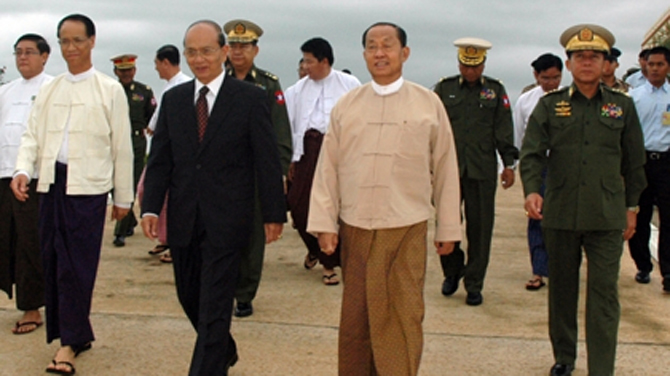Thein Sein: Reformist or Caretaker?

This is the final part of a three-part series. Part one is here, and part two is here.
If meeting with Suu Kyi was the act that convinced many that Thein Sein was serious about at least some degree of reform, then his decision to suspend work on the China-funded Myitsone Dam project was what helped dispel the notion that he was weak and indecisive.
The decision was a slap in the face to China, Burma’s giant neighbor and traditional ally that for years had shielded the Burmese regime from UN Security Council censure debates and international condemnation. But Thein Sein was rewarded for his audacity, because the move brought him domestic accolades, served as a signal to the West that Burma wanted to balance out its relationship with China and significantly increased the momentum for his reforms.
“Despite his tender appearance outside, he is usually a man of determination,” said presidential adviser Ko Ko Hlaing. “After consideration, he keeps his decisions steadfastly.”
However, some critics have noted that many other Chinese-funded and controlled mega-projects, including other Irrawaddy River dam projects and a gas pipeline and railway line to China’s Yunnan Province, remained untouched. There are also skeptics who continue to argue that all of the steps Thein Sein and his government have taken were a façade meant to gain the 2014 Asean chair and get Western sanctions lifted and international investment flowing into domestic businesses controlled by the ex-junta leaders and their cronies.
From the very beginning of his administration, Thein Sein has made no secret of the fact that one of his main goals was to forge good relations with Burma’s most vocal international critic, the US. From that point of view, his Myitsone gambit worked brilliantly to convince Washington that not only was he capable of making a break with the past, but also that he had something to offer.
In an op-ed in The Washington Post, Zaw Htay, the director of the president's office, made it clear that the Myitsone decision was not just about environmental concerns or the “will of the people,” as Thein Sein had said when he announced the suspension of the project.
“My president’s cancellation of the Beijing-backed Myitsone Dam signaled to the world what he stands for,” wrote Zaw Htay. “If the United States neglects this opportunity, Washington will part ways with the new order in the Indochina region.”
He added: “What the West must realize is that in today’s geopolitical situation, particularly given the rise of China, it needs Myanmar.”
By playing the China card so effectively—and at the same time demonstrating to China that Burma couldn't be taken for granted—Thein Sein greatly strengthened his hand, albeit at considerable risk to a relationship that remains crucial to Burma's future and, possibly, his own hold on power.
Even as he signaled a desire to move Burma away from its excessive dependence on Beijing, Thein Sein was careful to give China pride of place among the country's strategic partners. China was his first destination after coming into office, followed by India.
He also moved to cement ties with the rest of the Association of Southeast Asian Nations (Asean), hoping to use the grouping to enhance the legitimacy of his government, which after all owed its existence to an election widely dismissed as neither free nor fair.
In November, Thein Sein did in fact convince Asean to grant Burma its 2014 chair, and on the heels of that decision US President Barack Obama announced that Secretary of State Hillary Clinton would become the first top US diplomat to visit Burma in over 50 years. But while her visit itself gave the new government another injection of legitimacy, Clinton held the line and said that sanctions would not be lifted until further reforms were made.
That tough stance was later rewarded with the release of hundreds of political prisoners—a long-time demand of Washington and the West. On Jan. 13, some of Burma's most famous dissidents, including Min Ko Naing, Ko Ko Gyi and Gambira, were freed in yet another signal that Thein Sein was listening to his critics, both at home and overseas.
But there have also been signs that he is now facing real opposition from other quarters. Despite his public call on the Burmese military to end its offensive in Kachin State, attacks on the Kachin Independence Army continue to this day.
1 | 2 next page »
|
||
|
||
|
||
|
||
|
||
|
||
|
||
|
||
- Students Without a University
- Displaced and Distressed
- Training the Next Generation of Kachin Rebels
- Rangoon Art Show Provides Arresting Display
- Magical Mandalay Still Holds Court for Tourists
- Distrust and Displacement on Kachin Frontline
- School’s Not Out in Kachin State
- Irrawaddy Dolphins are Firm Fisherman’s Friends
- Thein Sein: Reformist or Caretaker?
- For Rangoon Strikers, No End in Sight
